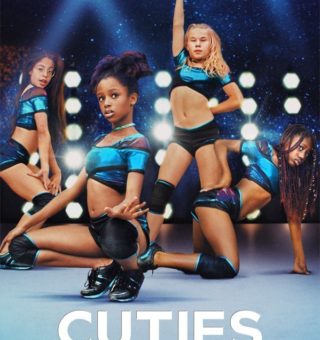- Because Our Children Are Watching
- Join the Cause
- Donate
Written by PTC | Published September 2, 2020
Recently, criticism of Netflix’s forthcoming movie, Cuties, rose to a fever pitch with people across the globe (including us) raising justified concerns about the fact that the film sexually exploited children.
Just take Netflix’s original description before an editor changed it due to the outcry: Cuties focuses on an 11-year-old girl and her friends as they “hope to twerk their way to stardom at a local dance contest.” This was accompanied by a highly sexualized image of these pubescent girls in suggestive dance poses. To Netflix’s credit, the company apologized and pulled the sexualized marketing image, replacing it with one that was much more lighthearted and innocent.
Yet Netflix did not pull the film itself, which, given Netflix’s track record of hosting content that sexualizes children, is still likely to contain sexualized images of young girls.

True to form, one film critic took to the Internet to mock people who were concerned about Netflix hosting Cuties at all.
Forbes contributor and film critic Scott Mendelson reported on the PTC’s criticism with derision:
Parents Television Council president Tom [Ed note: Tim] Winter condemned the movie in a statement by saying “the only motivation” for producing such a film is “to sexualize children and to fuel the appetites of those who would feed on the sexualization of children.” If I may, that such a motive could be the “only” reason for making a movie focusing on young girls coming to terms with the sexuality says a lot. Maybe, just maybe, Doucouré’s (a Black woman, by the way) feature is intended for young girls who themselves are coming to terms with their sexuality and/or their potentially discomforted parents. Once again, it’s up to girls to protect boys and men from their own uncontrollable libidos. The notion of a girl’s coming-of-age need not be defined by boys and men who might see that as a license to do harm.
Netflix has given Cuties a TV-MA (Mature Audiences) content rating, and earlier news reports suggested the MPAA rating assigned to the film was NC-17 – ostensibly the same thing as an X-rating. Keep in mind that violence and profanity doesn’t usually trigger an X-rating; extremely graphic sexual content does. Regardless whether the rating is TV-MA, NC-17 or X, this means that the film is rated for an age that precludes the young girls Mendelson says it’s intended for. How does he reconcile that? Either the film is “intended for young girls” to watch, or it isn’t. Generally, 11-year-old girls would be watching TV-PG rated content or lower. Not TV-MA.
As for Netflix, how can the company possibly reconcile a “coming-of-age” film, and one that centers entirely on 11-year-old girls, with a TV-MA rating? This is not a random decision – it has become corporate practice.
We have frequently called on Netflix to stop hosting content that sexualizes children, such as Baby, Big Mouth, Sex Education, or that glamorizes rape and sexual assault such as 365 Days.
And Netflix habitually markets adult content to young audiences. Parents Television Council research of Netflix programming designated as “Teen” reveals that nearly half was rated either TV-MA (104 titles, or 40.8%) or R (23 titles, or 9.0%); and every single program that carried a TV-14 moniker included harsh profanities.
While we may not always see eye-to-eye with film critics, the criticism of the critics is telling. Cuties is not the first time Netflix has blatantly promoted programming that sexualizes children, but we’re calling on them for this to be the last.